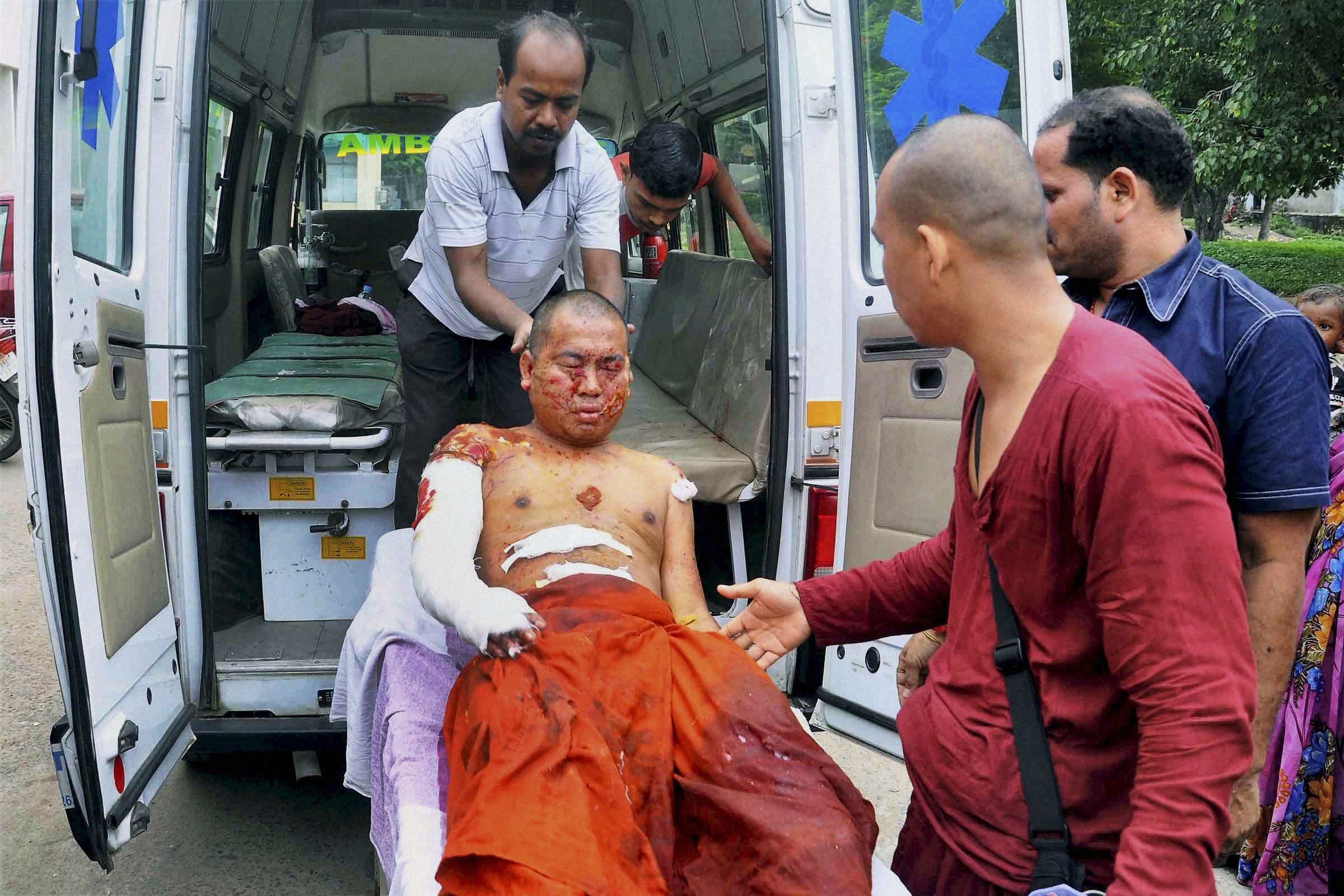
A voter can now exercise her democratic franchise by rejecting all the candidates and/or parties by pressing the “None of the Above” (NOTA) or “reject” button, following a Supreme Court judgment. However, will this kind of a vote make any real difference through a tangible outcome?
A three-member bench of the SC, led by Chief Justice of India, P Sathasivam, on 27 September, directed the election commission of India to provide a “none of the above” button on the Electronic Voting Machines (EVMs). The apex court said that the move was made to offer a choice to the people who stay at home and do not turn up to vote.
Earlier, there was a provision for people to inform of their abstention from voting but they had to disclose their names and electoral roll numbers. The Supreme Court held that this was against free and fair elections since an abstaining voter had to reveal their names. The NOTA button will allow a voter to cast his secret vote and reject candidates using a button on the EVM.
In the court, advocate Meenakshi Arora, on behalf of her client, the Election Commission of India (ECI), had agreed with the fact that there was no secrecy in the present way to register abstention voting. The ECI had asked that the NOTA button be allowed to be put in as a measure to ensure free voting even in case of abstention or rejection.
The crux of the argument of the additional solicitor general PP Malhotra was that secrecy of ballot was extended only to those that had voted in favour of a candidate. The Supreme Court held, “We are of the considered view that in bringing out this right to cast negative vote at a time when electioneering is in full swing, it will foster the purity of the electoral process and also fulfill one of its objective, namely, wide participation of people.”
The court also said, “When the political parties will realise that a large number of people are expressing their disapproval with the candidates being put up by them, gradually there will be a systemic change and the political parties will be forced to accept the will of the people and field candidates who are known for their integrity.”
PODCAST
Dr SY Quraishi, former chief election commissioner, told TEHELKA that a proposal for the provision of a NOTA button on the EVM had been pending since 2001 and it was a great move and would build moral pressure on the political parties.
“It is a bit too optimistic to interpret this judgment as creating a right to reject, as per my prima facie understanding of the judgment. SC is presuming that political parties are sensitive enough to buckle under pressure from NOTA votes. That is a little too optimistic. The only tangible outcome of this is that your secrecy is protected if you abstain and no bogus votes will be polled on your name,” said Quraishi.
“SC has not clinched the issue if majority NOTA votes can lead to a cancelling of the election. In my discussions with the Anna team, I told them that I did not support the “right to reject” because it would lead to several cancellations and too many re-elections. Any election is a logistical nightmare and to repeat will become a game. The Anna team said it would happen once or twice and not repeatedly as the political parties would learn their lesson from that. Their second point was that criminals cannot go and intimidate those who had not voted. The supreme court has upheld this in its judgment,” he said.
Prashant Bhushan, senior advocate, said, “Ultimately, if people opt for NOTA in several constituencies, this could build people’s pressure on parliament to pass legislation to cancel the poll in that constituency and hold re-elections in at least those constituencies.” Quraishi is skeptical of such pressure and says it is wishful thinking.
“PUCL are the original petitioners and in 2010 we intervened and supported this petition since we have been working on electoral reforms since 1999,” said Prof Trilochan Sastry, a professor at IIM Bangalore and a founder member, National Election Watch, and Association for Democratic Reforms (ADR). ADR has been working on electoral reforms for several years. They have also compiled an extensive database with analysis on politicians with criminal records and cases.
“The outcome is that there will be another button on the EVM and the election commission will also count the number of votes that are for ‘None of The Above’ candidates and it will be a part of the declared results. There is no provision of law or anything in the SC judgment to cancel the elections based on this. But, it will be embarrassing for political parties if they see that the number of reject votes is more than the votes they have got,” said Sastry.
“Political parties try to win at any cost. This system indirectly exposes them and makes them feel they are unlikely to win like this. So, they will try to change and hopefully not put up such candidates,” said Sastry.
The obvious task before the election commission is of course to try and translate this SC judgment into a tangible outcome of using the right to reject. “The SC judgment on right to reject is welcome. However, making it operational will be difficult and has to be well thought out and well-executed. It will not have any effect unless there is an outcome attached with the negative votes. The election commission has to formulate a strategy if this will mean that the negative vote will lead to cancellation of that election and require re-election or if the candidates will be disqualified. There has to be proper legal provisions for it,” said Lucknow-based advocate and former IAS officer SN Shukla.
“The SC has interpreted ‘right to reject’ as a right. This means that people who earlier abstained by staying at home can now come and express their dissent in a poll. For an effective outcome, the ECI can use the upcoming assembly elections in four states and / or the upcoming general elections as a pilot survey. The survey can be used to see how effective the right is and the best-possible effect it can have,” said Shukla, who is secretary of Lok Prahari. This is the same NGO that filed the petition leading to the July 2013 SC ruling that disqualifies convicted lawmakers from continuing to hold office or to re-contest elections during the subsequent six years.
The union cabinet has passed an ordinance and sent it to President Pranab Mukherjee for his seal. The ordinance seeks to veto the SC ruling and allow convicted lawmakers to continue in office. On Thursday, BJP leaders, Sushma Swaraj and Arun Jaitley approached the president to not pass the ordinance. Mukherjee has reportedly asked for advice on the matter.
In the meantime, on Friday, Congress vice-president, Rahul Gandhi made a rare appearance at the press club and in a sudden press conference, said that he did not support the ordinance. “Tear it up and throw it away. In my opinion, that is what you should do,” said Gandhi.
On Thursday, union minister of state for shipping Milind Deora also said, “Legalities aside allowing convicted MPs/MLAs to retain seats in the midst of an appeal can endanger an already eroding public faith in democracy.”
This showed a distinct split in the Congress party with the Manmohan Singh led government making way for the ordinance while Gandhi has publicly rejected it.
Shukla termed this as a publicity move. “Knowing very well the end fate of this ordinance, Rahul Gandhi is trying to take credit for not trying to stump the ordinance. Where was this move since August 24? Why is his rejection of the ordinance coming so late in the day?” said Shukla.
Dr Jayaprakash Narayan, president of the Lok Satta Party, recalled that the NOTA option will not be a game changer going by past experience. Hardly one or two percent of voters exercised such an option when Lok Satta campaigned hard to mobilise Negative vote. In Andhra Pradesh, fewer than 1 percent exercised the negative vote option when the State Election Commission tried it in local elections in the past.
He also said that the NOTA reform will also come in handy when voters feel none of the political parties or candidates in the fray is mirroring their feelings in time of emotional polarisation or surcharged atmosphere. The voters, especially in a local election, can express their wrath against all candidates if a long-pending problem is not addressed to their satisfaction. On occasion it could also be a weapon to mobilise sectarian vote based on caste or ethnicity in support of highly parochial demands.
The countries with protest / neutral votes are France, Belgium, Brazil, Greece, Ukraine, Chile, Bangladesh and State of Nevada, USA. While those with Blank Vote are Finland, Sweden, USA, Colombia and Spain.




